Search
Showing 10 of 1193 results for Value-priced treatments https://simplemedrx.top
-
Record audience for early childhood education symposium with China
This year, the symposium attracted a live audience of 350 attendees and a livestream audience of 100,000, well over the number of attendees in previous years. The symposium’s theme was ‘Advancing Inclusiveness in Early Childhood Education’.
The Early Childhood Education Symposium is an initiative between Education New Zealand Manapou ki te Ao (ENZ) and China Center for International People to People Exchange (CCIPE), a sub-agency of China Ministry of Education (China MoE).
The symposium provides a platform for New Zealand Early Childhood Education (ECE) institutions, academics, practitioners, and policy experts to engage in a cross-cultural dialogue. It leverages New Zealand’s expertise in ECE teacher training programmes.
This was the first year that a delegation of government representatives and ECE experts from New Zealand travelled to China to present at the symposium in person, which sent a positive signal to education partners in China about New Zealand’s strong focus on reconnecting and strengthening our education credentials in the China market.
The symposium’s live presenters from New Zealand included Dr Jane Ewens, Manager Early Learning, Ministry of Education and Fiona He, Director and Founder, TuiTui Educare/Universal Kids Early Education Centre. Dr Ewens presented an overview of the New Zealand Government’s policy focusing on advancing inclusiveness in early childhood education.
ENZ’s General Manager International, Lisa Futschek, who provided opening remarks, said the symposium highlighted the special education relationship between New Zealand and China and our long and fruitful dialogue in a variety of education areas.
“It’s fantastic to see how the symposium has grown and evolved since 2020. We were delighted to be able to travel there, grow our connections in-person, and enable collaboration between people across the education landscape in both our countries.
“2023 has already been an exciting year for rebuilding face-to-face connections for New Zealand and China, and the symposium just helped us build on that so wonderfully,” Lisa said.

ENZ General Manager International, Lisa Futschek.
CAO Diefeng, Deputy Director General, China Centre for International People-to-People Exchange indicated in his opening remarks that the China-New Zealand Early Childhood Education Symposium has received extensive attention because of its scale and influence. It is highly welcomed by the education sector from both China and New Zealand and is becoming a key platform for early childhood education communication.
“The symposium exemplifies the sound education cooperation between our two countries and plays an important role in deepening substantive cooperation by both sides,” CAO Diefeng said.
Dr Jane Ewens said the information exchange was valuable to all audiences and demonstrated there are opportunities for the Ministry of Education to learn from our Chinese partners.
“We can create stronger educational ties and foster ongoing cooperation with China, aligning with government priorities. This could include exploring attracting Chinese teachers and students to New Zealand's early childhood education teaching workforce.
“There is also an opportunity for New Zealand practitioners and policy makers to consider and possibly integrate how China implements their curriculum as we develop curriculum resources for New Zealand Early Childhood Education kaiako (teachers),” Dr Ewens said.
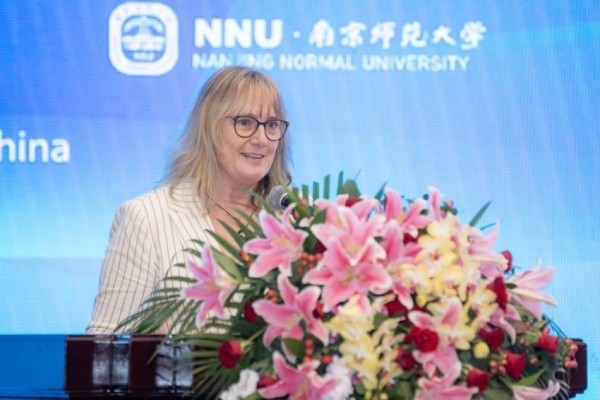
Dr Jane Ewens from the New Zealand Ministry of Education presents the Policy Overview.
This year’s symposium resulted in a range of valuable outcomes for New Zealand’s education relationship with China and for the sector. The symposium generated good visibility for New Zealand, with 45 media articles (accounting for almost four million views), which included reporting from top tier Chinese media. Many connections and leads for New Zealand participants were created during and after the symposium – one New Zealand speaker reported being approached by 50 Chinese counterparts after their virtual presentation.
Aside from the symposium, the New Zealand delegation’s key objectives included supporting a bilateral education initiative linked to the New Zealand-China Arrangement on Education Cooperation and Training, while showcasing New Zealand’s expertise in early childhood education practices and curriculum to audiences in China.
The visit provided a chance for the delegation to understand best practices in early childhood education from a Chinese cultural perspective that they could put into practice in New Zealand to better support learners from Chinese backgrounds. As part of the programme in Nanjing, the delegation visited two kindergartens and presented a panel session with academics and students at Nanjing Normal University.
If you are interested in the ECE Symposium or partnering with ENZ on this event in the future, please contact the ENZ China team at China@enz.govt.nz.
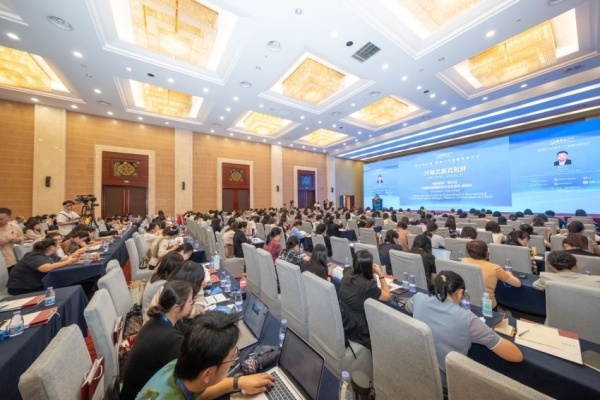
The audience in Nanjing take notes during the presentations.
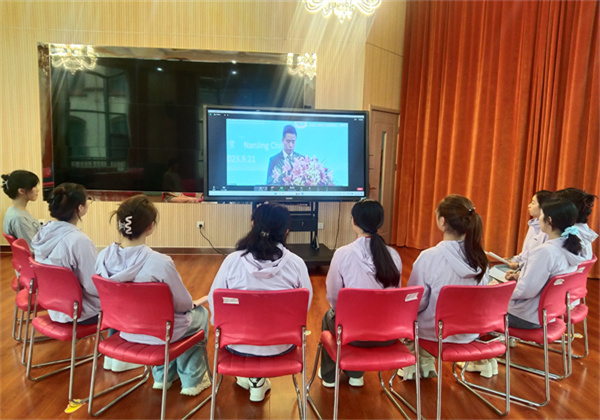
Attendees of the Hefei Shuangyou Education Group in Anhui Province watch the symposium online.
-
SheLeads Campaign – inspiring future Indian learners
Launched on International Women’s Day on 8 March, the SheLeads campaign was developed by Education New Zealand Manapou ki te Ao’s (ENZ's) India-based team. The campaign was multi-pronged and aimed to celebrate women leaders and alumni across various disciplines from New Zealand education providers with a diverse audience of young and mature learners in India.
The campaign was launched on ENZ’s South Asia LinkedIn channel which was then used throughout to highlight the impact and value of a New Zealand education through the sharing of success stories of women leaders in New Zealand and beyond as well as those of Indian women alumni. Education media across several key Indian publications also reported on the campaign to their estimated 58 million readers.
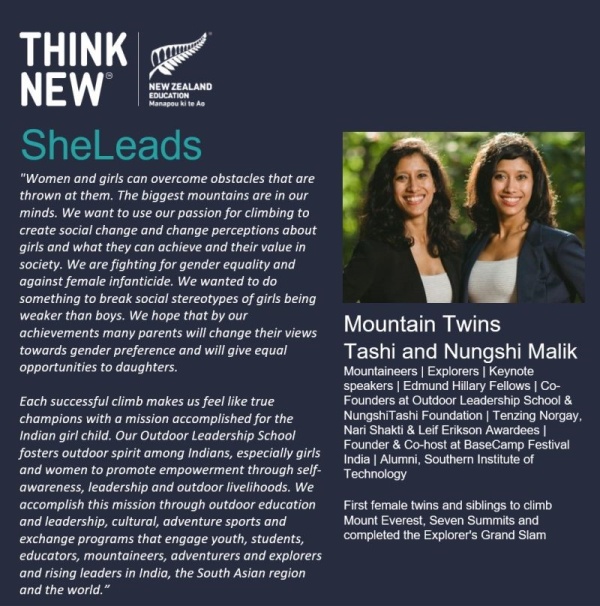
The LinkedIn campaign profiled over 24 women leaders and achieved 105,000 impressions, 1,500 page views, while the ENZ South Asia page gained more than 600 new followers, surpassing the campaign’s targets.
To engage students and lift the NZ education profile amongst this group, a SheLeads debate competition was organised between five leading schools in Delhi. The students were tasked with debating “the underrepresentation of women in STEM”’ and the 50 plus participants were invited to share diverse perspectives and include examples from New Zealand.
Undergraduate learners from over 100 tertiary Indian Institutions were also invited to participate in the campaign through submission of video essays. A shortlist of 10 entries were judged by Professor Carol Mutch from the University of Auckland’s Faculty of Education and Social Work.
Images from the SheLeads debate competition held at Delhi Public School.
Finally, ENZ hosted a virtual workshop on ‘Organisational Change and Resilience’ with school principals and leaders from over 500 schools across India invited to attend. This workshop was facilitated by AcademyEx Founder, Frances Valintine and discussions focused on the innovative approach to learning that leaders must now consider in this rapidly changing world.
The finalists and winners of both competitions were invited to a campaign concluding event at the New Zealand High Commission in New Delhi on May 18. The event featured an engaging line up including an inter-school debate competition for the debate competition finalists, a panel discussion featuring alumni titled “Trailblazers: Women leaders who catalyse change” and the SheLeads Essay Showcase featuring the top three finalists. New Zealand’s High Commissioner to India, H.E Patrick John Rata was on hand to present the winners with their awards in front of guests that included high school counsellors, students, parents, and representatives from New Zealand institutions as well as the Principal of Jesus and Mary College in New Delhi.
ENZ’s Director of Engagement East Asia and India, Jugnu Roy, said that it was a huge privilege being able to interview so many talented women leaders and alumni to showcase their outstanding achievements. She also said that seeing the energy and enthusiasm that the students brought to both competitions was another campaign highlight.
“New Zealand has a proud history of striving for gender equality and continues to improve outcomes for women by strongly supporting women in education and training, utilising women’s skills to grow the economy, and encouraging and developing women leaders.
“I am sure this campaign will inspire our students here in India, particularly our female students, to consider choosing New Zealand as an education destination and follow in the footsteps of these incredible role models,” said Jugnu.
-
New Zealand to be Country of Honour at China Annual Conference for International Education and China Education Expo 2025
CACIE is the largest international education conference in China connecting professionals, researchers and international education stakeholders. The 2023 Expo hosted 18 national pavilions, attracting 364 institutions from 34 countries and regions with a total of 28,980 visitors, including prospective students. New Zealand has participated in CACIE for 19 consecutive years.
The Expo is scheduled for late October 2025 in Beijing, China.
Michael Zhang, Regional Director Greater China, ENZ said, “Being Country of Honour is not only a privilege, it is a significant opportunity to raise awareness of New Zealand’s education offerings to China and a wide audience, including government leaders and officials, education providers, agents and students.”
The invitation builds on the momentum from high-level education engagements with China in the past two years since the borders reopened, including Premier Li’s visit to New Zealand in June 2024, and two visits to New Zealand by Education Minister Huai Jinpeng in 2023 and 2024.
China is New Zealand’s largest source country of international students accounting for 35 per cent of enrolments in 2023, and a top destination for New Zealanders on the Prime Minister’s Scholarship for Asia.
Zhang said, “Education links are an important part of New Zealand’s relationship with China. Being Country of Honour is an opportunity to support our international education sector to strengthen their links with Chinese counterparts and build new connections. This will help enhance student mobility, academic and research collaboration, and people-to-people links.”
Education New Zealand leads New Zealand’s education engagement with China and supports our providers in-market. This includes managing bilateral education cooperation initiatives such as high-level dialogues, sectoral forums, student mobility channels, national-level education events and research programmes such as the long-standing Tripartite Partnership Programme.
-
ENZ showcases New Zealand’s commitment to sustainability in education and UN SDGs in India
Education New Zealand Manapou ki te Ao (ENZ) hosted a vibrant Sustainability Carnival on 14 November at the New Zealand High Commission in New Delhi to round off ENZ’s #SustainableTomorrow campaign that was designed to highlight New Zealand’s commitment to SDGs and sustainability in education.
The event showcased New Zealand university course offerings and officially launched ENZ’s Sustainability Guide, a comprehensive resource profiling course offerings in sustainability at New Zealand universities and the New Zealand Institute of Skills and Technology (NZIST).
The event saw over 150 attendees, including representatives from five New Zealand universities, three Indian universities, and students, parents, and teachers from New Delhi’s international schools. The Sustainable Tomorrow campaign was launched as a comprehensive digital and social campaign to spotlight sustainability within the educational landscape. Through diverse activities, and partnerships, the campaign highlighted New Zealand's commitment to embedding sustainable practices in education. It reached 82,266 accounts via the New Zealand in India Instagram page, engaged 2,935 accounts and saw 165 profile visitors.
As part of the campaign, ENZ launched a digital poster design competition for Indian high school students. Centred around the Innovating for a Sustainable Future theme, the competition aimed to raise awareness of key United Nations Sustainable Development Goals (SDGs), including Goal 7 (Affordable and clean energy), Goal 9 (Industry, innovation, and infrastructure), Goal 12 (Responsible consumption and production), and Goal 13 (Climate action). The winning posters were unveiled and recognised at the Sustainability Carnival, which also featured a series of other exciting activities, including street plays performed by students on the importance of sustainability, as well as a croquet match with the New Zealand High Commissioner to India Patrick Rata.
ENZ’s Director of Engagement, India and East Asia, Jugnu Roy, said the campaign did well to spotlight New Zealand’s strong credentials in sustainability stewardship to secondary school students, teachers and parents in India.
“The campaign was a fantastic opportunity to highlight New Zealand universities’ sustainability leadership, particularly their top global ranking for sustainability stewardship in the Times Higher Education Impact Rankings 2024.
“The launch of the ENZ Sustainability Guide that promoted course offerings related to UN SDGs at New Zealand universities and Te Pūkenga really drove home the message about New Zealand’s commitment to a sustainable future that’s visible through our wide range of sustainability-focused education offerings,” Jugnu said.

New Zealand High Commissioner to India, Patrick Rata interacts with New Zealand university and Te Pūkenga representatives at the Study with New Zealand booth at the Sustainability Carnival.

Secondary school and higher education institution students and teachers from India with New Zealand High Commissioner to India, Patrick Rata at the Sustainability Carnival in New Delhi.
-
Winners of KIWI Challenge announced
This year was the first where university students were able to enter a new category alongside the schools' challenge.
The winning teams from Petra Christian University and USG Education headed off strong competition from eight other finalists, drawing praise from the judges for their solutions to support youth-led Small and Medium Enterprises (SMEs).
Finalists presented to a panel of judges from University of Otago – Ōtākou Whakaihu Waka and Education New Zealand Manapou ki te Ao (ENZ), who were cohosting the initiative.
Both winning teams received a voucher valued at 10,000,000 Indonesian Rupiah (approximately 1,000NZD) as well as virtual internships from the University of Otago – Ōtākou Whakaihu Waka commencing in semester one, 2025.
Tech-led solutions
A team from Petra Christian University developed an app ‘Partify’ which connects emerging small businesses and keen part-time workers. Businesses post part-time jobs, and workers swipe to find flexible gigs nearby, with AI matching candidates based on skills, location, and availability.

Partify university winner – ENZ market manager Naluri Bella and University of Otago Regional Market Manager Sarah Ewing present the award for First Place in the University category to team members from Petra Christian University for their app ‘Partify’.
In the high school category, a team from USG Education took the top prize with ‘LAW4MSME’, a platform allowing small businesses to access legal information and advice.
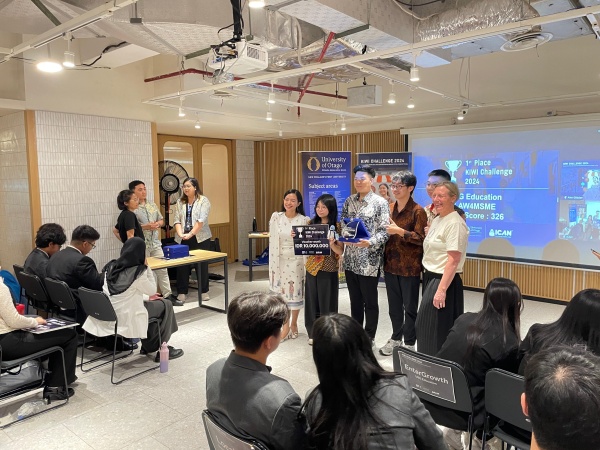
LAW4MSME High school winner - ENZ market manager Naluri Bella and University of Otago Regional Market Manager Sarah Ewing present the award for First Place in the University category to team members from USG Education for their platform “LAW4MSME’.
Explaining the group’s business idea, team leader for LAW4MSME, David Francis said the students found that Indonesian youth-led SMEs lack knowledge of the laws and regulations needed to run their businesses.
“To address this, we developed an AI bot that educates SME owners on these regulations, helping them navigate legal requirements more effectively,” David said.
The KIWI Challenge competition aims to inspire youth across Indonesia to engage in entrepreneurial activities and help resolve societal issues. Over the five years the competition has run, 1000 Indonesian youth have participated. This year, Education New Zealand Manapou ki te Ao (ENZ) partnered with University of Otago to co-host the initiative.
This year’s competition included 49 teams with a total of 221 student participants.
Mentorship key
Mentorship is a key element of the competition. The finalists attended a workshop run by Associate Professor Dr Conor O’Kane, Head of the Bachelor of Entrepreneurship programme at Otago Business School. This assisted entrants to develop their ideas and refine business plans.
ENZ Acting General Manager International Ben Burrowes said he’s delighted to see the continued development of the KIWI Challenge.
“Inviting university students for the first time has given us the opportunity to include a whole new cohort of talented young entrepreneurs, and we have been very impressed with the quality and creativity of their submissions,” Ben said.
“The competition has also benefitted from the enthusiasm and expertise of our colleagues at the University of Otago, and we are grateful for their willingness to partner with us for the KIWI challenge’s fifth year.”
Dr O’Kane said it was inspiring to witness the quality of entrepreneurial thinking among Indonesian students.
“These students have very bright futures. The concepts and programmes the finalists presented were remarkable and captured the impressive ability of the teams to identify tangible business problems and visualise and communicate a solution to these challenges,” Dr O’Kane said.
-
New Zealand universities showcased to global education leaders at QS India Summit 2025
The initiative was well aligned with ENZ’s goal to build global connections for New Zealand education and explore solid opportunities that will help New Zealand thrive through world-class international education.
Education New Zealand Manapou ki te Ao (ENZ), along with the University of Canterbury, University of Waikato and Massey University made an impactful presence across a range of sessions and workshops.
The summit had the New Zealand contingent showcase the quality of our universities and engage in discussions focused on university-industry collaborations, workforce development, global research leadership, while discussing the importance of building resilient, education institutions that can adapt to a rapidly changing world.
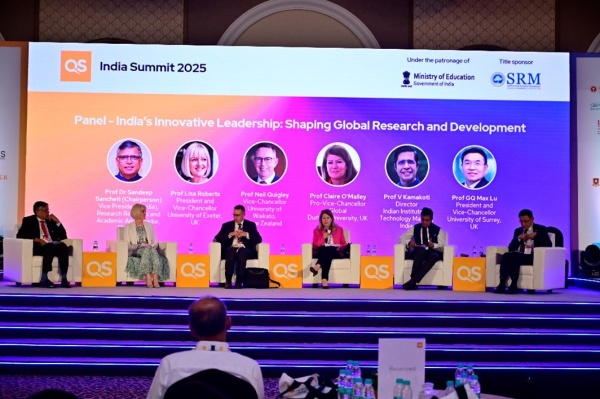
Prof. Neil Quigley, Vice-Chancellor of the University of Waikato, exploring India’s leadership in cost-efficient R&D and its role in supporting global partnerships to address pressing challenges at the QS India Summit 2025.
ENZ’s Director of Engagement, East Asia & India, Jugnu Roy, led a discussion on aligning curricula with emerging job market demands to better prepare students for global careers.
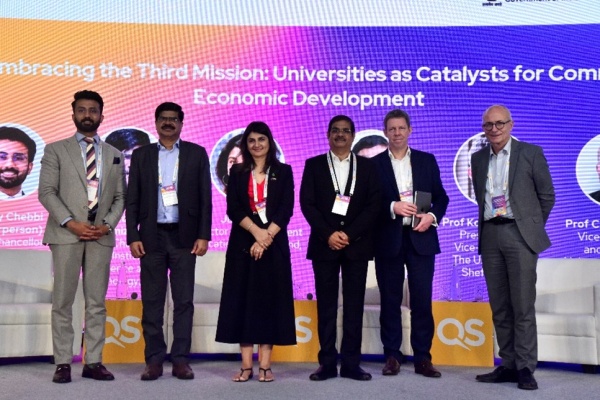
ENZ’s Jugnu Roy discussed how universities could drive social and economic impact beyond their primary roles of teaching and research at the QS India Summit 2025.
Considering how well recognised New Zealand universities are globally, with all eight ranked in the top 2 percent in the 2025 QS World University Rankings, the QS Summit was an opportunity for New Zealand education to strengthen its relationships with key global and Indian education leaders, Jugnu said.
“New Zealand universities are also known for their sustainability stewardship, with our universities ranking first for sustainability stewardship and second for sustainability outreach in the Times Higher Education Impact Rankings 2024.
“Within this context, the summit was a strong platform for us to share best practices and explore new avenues for collaboration between New Zealand and India.
“We look forward to collaborating with global and Indian leaders in education to shape a brighter future together.”
-
Hundreds of Brazilian high school students arrive at New Zealand schools
Over January and February, 200 students from Paraná and 100 from São Paulo arrived in New Zealand on a Brazilian state-funded scholarship that will have them spending a semester and term in New Zealand schools while staying with host families.
Chosen for their academic performance, attendance, and completion of an English course, these top students get a chance to immerse themselves in New Zealand's education system and culture.
New Zealand is considered a strategic partner by Paraná state and São Paulo. This programme highlights the success of increased educational cooperation between Brazil and New Zealand. In addition to improving English proficiency, the initiative also aims to develop intercultural skills.
Paraná's programme, launched in 2019, has sent 1,240 students to various countries, with more than 600 going to New Zealand.
Coordinator of the São Paulo programme, Simone Telles, said New Zealand was chosen for this programme due to our innovative education system, use of technology, the freedom given to students and the welcoming nature of New Zealanders.
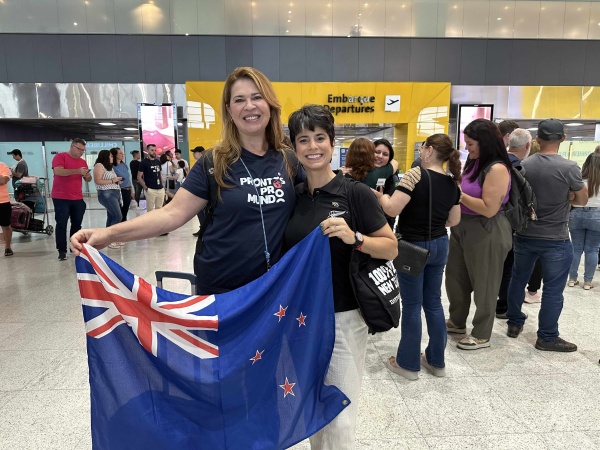
Simone Telles and ENZ’s Market Development Manager, Bruna de Natale: Education partnership between São Paulo and New Zealand.
In São Paulo, ENZ Market Development Manager, Bruna de Natale, attended one of the departure days for the group traveling to New Zealand. Bruna spoke to Luciangela Fonseca, mother of one of the selected students, Juan Fonseca. Luciangela said she felt “pride mixed with fear and emotion” and that the family felt privileged to get this opportunity.
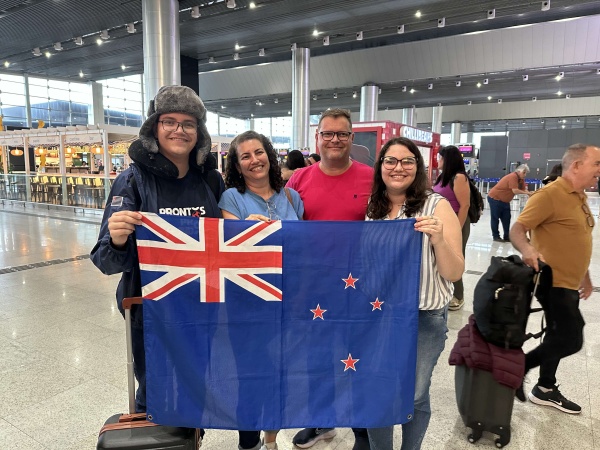
Juan Fonseca, his parents, and sister. Emotions at the departure for Auckland.
All programme costs are funded by Brazilian states, including transportation, education, food, accommodation, and leisure activities.
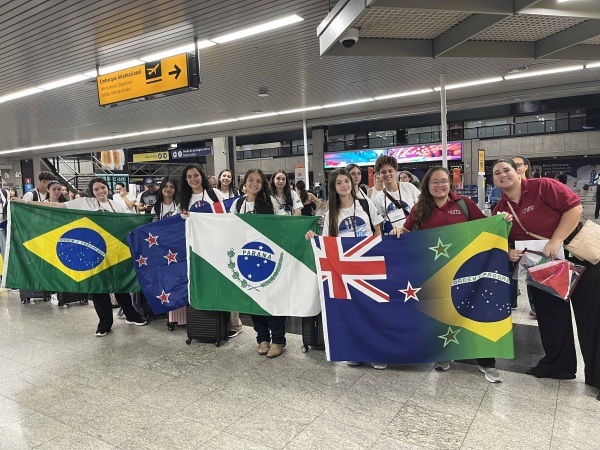
Paraná students departing in São Paulo.
-
New Zealand-trained astrophysicist receives top honour in Malaysia
She was awarded the prestigious Commander of the Order of Loyalty to the Crown of Malaysia, by Sultan Abdullah at his annual Honours ceremony. It carries the title of Tan Sri, one of the highest federal titles, and is only held concurrently by 250 living recipients.
Dr Othman studied physics at the University of Otago in the 1970s and returned for post-graduate study in the 1980s, becoming the first woman to graduate from the university with a PhD in Astronomy and Astrophysics. She then went on to forge a remarkable career in the male-dominated space industry.
Colombo Plan Scholar
Dr Othman came to New Zealand on a Colombo Plan scholarship. The Plan, a forerunner to our modern development assistance programmes, aimed to promote economic and social development in Asia through education and training.
Having fallen in love with physics as a teenager in the 1960s, Dr Othman didn’t discover astronomy or astrophysics until she arrived in Dunedin to study for her PhD in 1974.
“There were very few books available at that time and there was not much interest here in Malaysia, but it was very different in New Zealand,” she says. “Neil Armstrong’s landing on the moon in 1969 was a very significant event, but I didn’t think at that time that I would have space as a career. Not in a million years.”
Studying in New Zealand opened a world of opportunity for the young, Muslim scholar. Not only did she make a career in the space industry, but she became a leading authority, being appointed the Director of the United Nations Office of Outer Space Affairs in 1999, and the founding director of Malaysia’s National Space Agency in 2002.
She acknowledges it has been challenging at times. “It’s been a hard road because I’ve had to start everything from scratch. There was no set path to get to where I am today.”
Working to promote science and technology
She says her role at the UN was less about science, and more about diplomacy and politics. “How to balance one country’s requirements against another’s. Bringing people to the table together, even if they don’t agree, to try and agree on how to proceed. The other aspect of the job was to see how we could use space to enhance the development of developing countries, especially in science and technology.”
It is mostly her work at home for which she has been recognised by the King. As Malaysia’s first astrophysicist, Dr Othman was instrumental in introducing astronomy and space sciences into school and university curricula, advised the Government on space matters, was the driving force behind the National Planetarium in Kuala Lumpur, initiated the country’s National Microsatellite Programme, and headed Mega Science 3.0, the ambitious project to transform Malaysia into leading global player in science and innovation by 2050.
Justice and fairness in New Zealand education
But it all started as an international student in New Zealand, a time Dr Othman remembers as being both liberating and rewarding. “I particularly loved the egalitarian environment of the university, and that reflected wider New Zealand society.”
“There will always be a role for New Zealand in supporting education internationally through its cultural perspective on science,” she says. “There is no hierarchy in New Zealand science – professors treat their students as equals and encourage them to challenge and ask questions. That approach has stayed with me through my career.
“New Zealand education also instils a deep sense of justice and fairness.” – Malaysia alumna and astrophysicist Dr Mazlan Othman.
-
New Zealand strengthens its position as a study abroad destination for Brazilians
Figures from the 10th annual Brazilian Educational and Language Travel Association (Belta) Seal Survey 2025 show that New Zealand has climbed to the sixth most chosen destination by Brazilians studying abroad – compared to seventh place in 2024.
The survey ran from February to April this year and brought together insights from 586 education agencies and 1,780 students from across Brazil to understand trends, behaviours, and preferences in the international education sector.
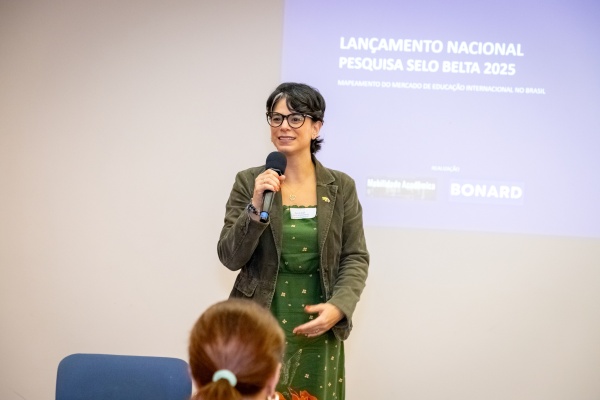
At the survey launch in May, ENZ Market Development Manager, Bruna de Natale, discussed the country’s growing relevance as a study destination for Brazilian students.
Speaking at the survey launch event in May, ENZ Market Development Manager, Bruna de Natale said "The data shows that New Zealand has not only maintained its appeal but has also strengthened its position on the radar of Brazilian students, especially amid uncertainties in other markets."
Dive into the data
Language courses remain the most sought-after programs, accounting for 91% of preferences among the agencies surveyed.
Why Brazilian students are choosing New Zealand
According to the data, the main factors driving the choice of New Zealand as a destination are:
-
High quality of life and safety
-
Academic excellence with a focus on innovation
-
Ease of obtaining a student visa
-
Permission to work while studying
-
Economically and socially stable environment
In addition, the growing demand for enriching cultural experiences, closer contact with nature, and the opportunity to develop socio-emotional skills has placed New Zealand in the spotlight — particularly among students who value a comprehensive education.
Additional insights from New Zealand-focused questions
A complementary survey, also conducted between February and April 2025 with 586 education agencies and 1,780 students across Brazil, highlighted specific factors influencing the decision to study in New Zealand.
The survey revealed that 75% of respondents who showed interest in New Zealand also considered it one of their top study destinations — ahead of countries like the United Kingdom and Canada. Students associate New Zealand with high-quality education, a good international reputation for its institutions, and globally recognised qualifications.
Additionally, New Zealand stands out for offering work opportunities during and after studies, socio-emotional skill development, and access to nature and outdoor activities — these factors align with current student preferences for holistic and life-enriching study abroad experiences.
If Brazil and/or any other Latin American country is part of your business plan for the 2025/26 financial year, please contact the in-market team via Latinamerica@enz.govt.nz.
-
-
Driving student interest in Indonesia through strategic co-funded initiatives
ENZ and SUN Education delivered a jam-packed programme of student recruitment events in Surabaya and Jakarta in late May to drive student interest and connect New Zealand providers with potential partners for academic collaboration.
Surabaya
The activity began with an introductory meeting between Universitas Airlangga’s International Office and visiting New Zealand providers to explore opportunities for academic collaboration between our two countries.
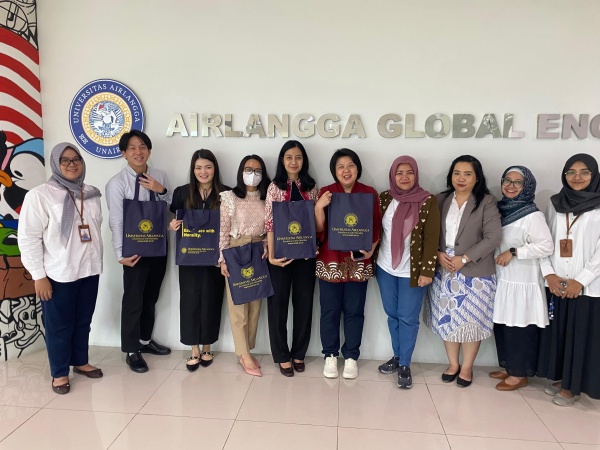
The meeting was attended by representatives from the University of Auckland, Auckland University of Technology, the New Zealand Honorary Consulate in Surabaya and SUN Education.
Discussions centred on potential areas of partnership, including articulation pathways, staff exchanges, guest lectures, and joint research initiatives.
The following day, providers met with prospective students at the Study in New Zealand Exhibition in Surabaya.
The exhibition featured the University of Auckland, Auckland University of Technology, University of Waikato, UP Education, University of Otago, Le Cordon Bleu, the Southern Institute of Technology and Lincoln University.
The event attracted around 200 students and their parents.
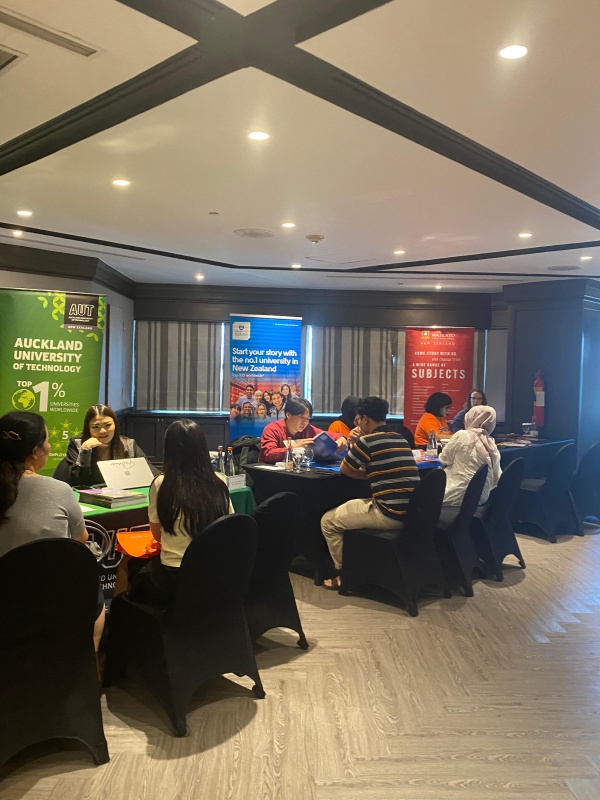
Study in New Zealand exhibition attendees learning about tertiary education options in New Zealand.
Jakarta
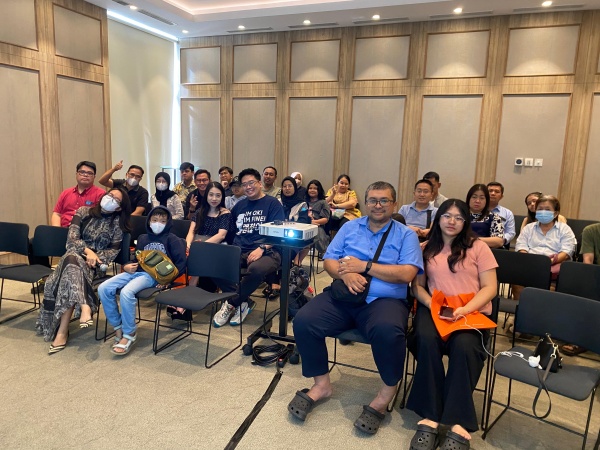
Over to Jakarta, ENZ organised an exhibition featuring a strong line-up of New Zealand institutions, comprised of all eight of New Zealand’s universities alongside the Southern Institute of Technology, Le Cordon Bleu, University of Canterbury International College and UP Education.
The fair attracted approximately 250 students and parents, all eager to explore the diverse study options and world-class education opportunities that New Zealand has to offer.
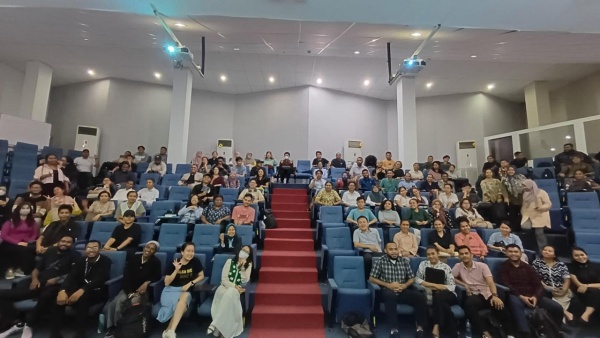
To close off a busy student recruitment period, a mini exhibition was hosted at Universitas Indonesia, the top-ranked university in Indonesia.
The exhibition was specifically for LPDP Affirmative Scholars and students interested in postgraduate-level study.
As part of the event, ENZ Market Manager, Naluri Bella, delivered a ‘Study in New Zealand’ session, which attracted around 100 enthusiastic attendees.
The session provided insights into New Zealand’s high-quality education system and scholarship opportunities, helping to raise awareness and inspire future postgraduate study pathways.
ENZ’s Regional Director (Asia) Ben Burrowes said the activities were designed enhance agents’ and students' awareness of New Zealand’s world-class education offering.
“These collaborations help position New Zealand as a competitive and credible choice for Indonesian students,” he added.

